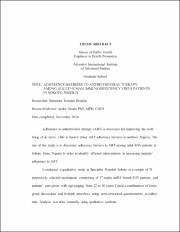| dc.description.abstract | Adherence to antiretroviral therapy (ART) is necessary for improving the wellbeing
of its users. Little is known about ART adherence barriers in northern Nigeria. The
aim of this study is to determine adherence barriers to ART among adult HIV patients in
Sokoto State, Nigeria in order to identify efficient interventions in increasing patients’
adherence to ART.
I conducted a qualitative study at Specialist Hospital Sokoto in a sample of 31
purposively selected participants comprising of 17 males and14 female HIV patients, and
patients’ care givers with age ranging from 22 to 56 years. I used a combination of focus
group discussions and in-depth interviews using semi-structured questionnaires to collect
data. Analysis was done manually using qualitative methods.
This study identified ART adherence barriers which were diverse in nature and
belonged to a wide spectrum of factors including patient related, health service related,
socioeconomic related, and cultural and religious related barriers. Forgetfulness, busy
schedules, inadequate time during consultation, lack of confidentiality, long waiting time,
low income, low literacy level, feeling better on ART, lack of social support and stigma
from family, and community levels were found to negatively affect adherence to ART.
This study suggests strategies for addressing adherence barriers to ART which should be
taken at patient, health facility, community, and government levels. Further research is
needed to assess the magnitude of non-adherence to ART in Sokoto using quantitative
measures. | en_US |

